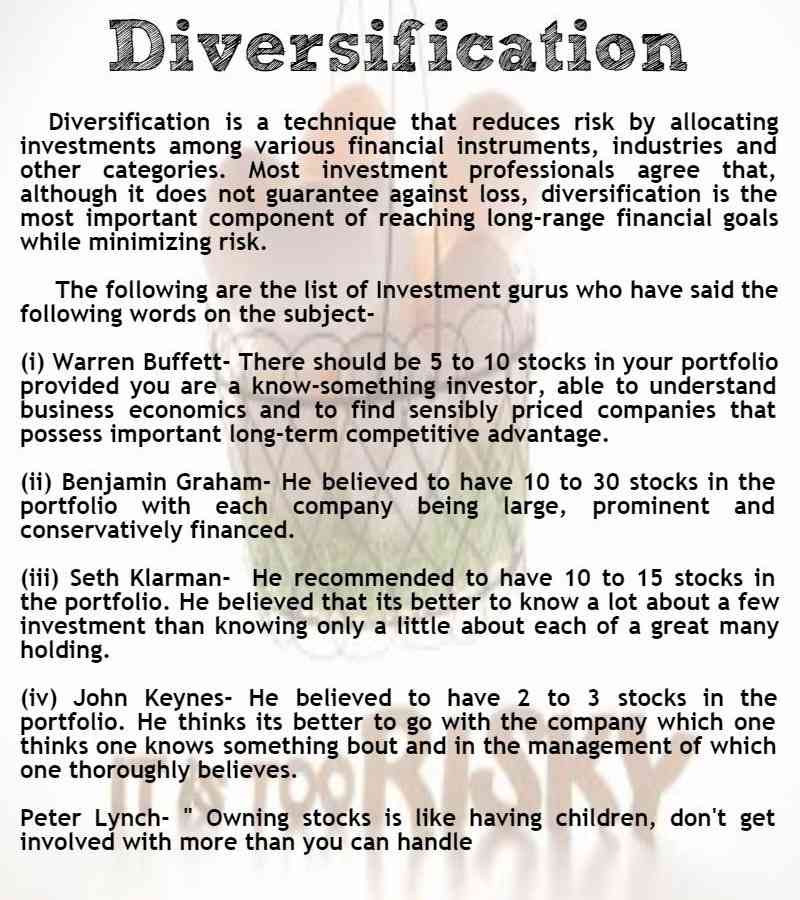How many children do you have? Do you believe in having one or two children or having a bunch of kids thus following the Indian legacy?
There are a number of factors involved in this matter namely education, psychological factor, family pressure etc. No one is wrong or right in this regard and everyone has their own judgment.
The same logic applies to investing as well and here comes the concept of Diversification.
Peter Lynch who said, “Owning stock is like having children, don’t get involved with more than you can handle”.
What Is Diversification?
Diversification implies that instead of putting all your funds in a single security, you should segregate them into a number of securities in order to reduce risk.
Learn to become your own portfolio manager in just 2 hours by Market Experts
Even if one or two of the company goes bankrupt, your portfolio as a whole is not greatly affected. There is a saying- “Never put all your eggs in one basket”.
But there is a very big problem which many of us actually struggles with i.e. how many stocks should we include in our portfolio?
So shall we go for portfolio diversification ( i.e. eggs in many baskets) or concentrating( i.e. eggs in very few baskets) ?

There is a term called unsystematic risk in portfolio management which says that diversification reduces unsystematic risk.
But there is a limit until which it reduces risk and thereafter it becomes constant.
Every person has their own way of thinking and it differs widely.
Benjamin Graham, father of Value Investing believed to have ten to thirty stocks in your portfolio, who in his book ‘Intelligent Investor’ wrote,
“There should be adequate though not excessive diversification. This might mean a minimum of ten different issues and a maximum of about thirty”.
Harry Markowitz, a renowned economist of 1950s supported Graham’s view and believed it to be a bad idea to put all the funds in just a few stocks rather should diversify across a large number of stocks.
He said, “Diversification is both observed and sensible; a rule of behaviour which does not imply the superiority of diversification must be rejected both as a hypothesis and as a maxim”
On the other hand, investors like Buffett, Fisher, Keynes etc. believed to have limited the holding to fewer stocks.
The idea of holding and focusing on just a few investments was learned by Buffett from Philip Fisher.
Fisher believed that it was a mistake to teach investors that putting their eggs in several baskets reduces risk.
The main problem in purchasing a large number of stocks might make it impossible to watch closely all the eggs in all the baskets.
Fisher said, “ buying shares in a company without taking the time to develop a thorough understanding of the business was far riskier than having limited diversification”.
Warren Buffett said,
“If you are a know-something investor, able to understand business economics and to find five to ten sensibly-priced companies that possess important long-term competitive advantages, conventional diversification makes no sense for you.
It is apt simply to hurt your results and increase your risk. I cannot understand why an investor of that sort elects to put money into a business that is his 20th favourite rather than simply adding that money to his top choices -the businesses he understands best and that present the least risk, along with the greatest profit potential.
In the words of the prophet Mae West: “Too much of a good thing can be wonderful”.
In 1934,
John Maynard Keynes said,
“As time goes on I get more and more convinced that the right method in investment is to put fairly large sums into enterprises which one thinks one knows something about and in the management of which one thoroughly believes.
It is a mistake to think that one limits one’s risk by spreading too much between enterprises about which one knows little and has no reason for special confidence.
One’s knowledge and experience are definitely limited and there are seldom more than two or three enterprises at any given time in which I personally feel entitled to put full confidence”
Last but not the least,
Seth Klarman said,
“Even relatively safe investments entail some probability, however small, of downside risk. The deleterious effects of such improbable events can best be mitigated through prudent diversification.
The number of securities that should be owned to reduce portfolio risk to an acceptable level is not great; as few as ten to fifteen different holdings usually suffice.
My view is that an investor is better off knowing a lot about a few investments than knowing only a little about each of a great many holdings. One’s very best ideas are likely to generate higher returns for a given level of risk than one’s hundredth or the thousandth best idea.”
Bottomline:
The problem with most of the investors is that in the name of diversification, they put little money in hundreds of stocks knowing nothing about the majority of them which is nothing but speculation.
They do it on the belief that some out of them might work and fetch good return for them but actually, it reduces the return to a great extent than putting money in well-researched stocks.
It is said that- “Too much of anything is bad”, so how investing be an exception to that.
Lastly, diversification or concentration depends on one’s ability and mentality.
You see most of us have a concentrated portfolio when it comes to real estate or bullion.
One has to first identify his style and based on that he should decide. We have so many great personalities, each having their own style which worked for them.
An investor can use their words as a reference but should try to understand himself and come out with his own style.








